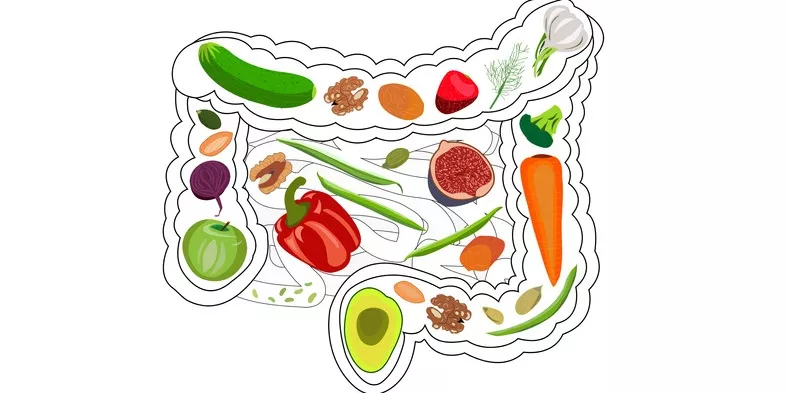The health benefits of “Healthy Diet” and high consumption fruit, vegetables and dietary fiber have been promoted for many years. Diet is a key modifiable factor influencing the composition of the gut microbiota, indicating the potential for therapeutic dietary strategies to manipulate microbial diversity, composition, and stability. Much of the supporting evidence is circumstantial or even contradictory and mechanisms underlying health benefits of specific foods are poorly understood. Dietary fibers can act as prebiotics, encouraging growth of saccharolytic bacteria, but other mechanisms are also important. Some but not all soluble fibers have a ‘contrabiotic’ effect inhibiting bacterial adherence to the epithelium. This is particularly a property of pectins (galacturonans) whereas dietary fructans, previously regarded as beneficial prebiotics, can have a proinflammatory effect mediated via toxic effects of high butyrate concentrations.
This also suggests that ulcerative colitis could in part result from potentially toxic faecal butyrate concentrations in the presence of a damaged mucus layer. Epithelial adherence of lectins, either dietary lectins as found in legumes, or bacterial lectins such as the galactose-binding lectin expressed by colon cancer-associated Fusobacterium nucleatum, may also be important and could be inhibitable by specific dietary glycans. Conversely, emulsifiers in processed foods may increase bacterial translocation and alter the microbiota thus promoting inflammation or cancer. Focusing on one condition is of limited value although in developing public health messages and growing evidence for impacts of dietary components on all-cause mortality is gaining more attention. We are only just starting to understand the complex interactions between food, the microbiota and health.
The impacts of fiber on microbiota are complex and also depend on the existing microbiota. Mice colonised with human microbiota and maintained on a low-fiber diet through successive generations developed an increasingly low diversity microbiota that also became increasingly resistant to reversal by increased fiber intake. If the same applies in human subjects then populations in whom a Westernised diet has become habitual over several generations may have a microbiota that is relatively resistant to change. Short-term dietary intervention studies may miss this but have nevertheless produced some very interesting findings.
O’Keefe and colleagues performed a 2-week cross-over study in which African Americans and rural Africans switched between a typical high fiber, low fat African-style diet and a high fat, low fiber western diet. A switch to
the African-style diet induced saccharolytic fermentation, butyrogenesis and suppressed secondary bile acid formation whereas switching to the low fiber, high fat diet induced contrary changes that included an increase
in colonisation by F. nucleatum. Similarly, David and colleagues showed that even a shorter 5-day dietary switch between a predominantly animal-based diet and a plant-based diet induced marked changes with an
increase in bile-tolerant bacteria and reduction in saccharolytic bacteria on the animal-based diet.
Plant-based foods such as fruit, vegetables, legumes, whole grains and nuts contain dietary fiber. While fiber as a whole is generally accepted to be beneficial to gastrointestinal health, specific dietary fiber types including inulin, FOS and GOS are also considered to be prebiotic; defined as “a substrate that is selectively used by host microorganisms conferring a health benefit”. The definition of prebiotics goes beyond these traditional compounds to include any food component that reaches the large intestine and elicits a selective effect on microbial growth to confer a health benefit. These compounds are resistant to gastric acidity and hydrolysis by digestive enzymes, bypassing absorption in the upper intestine to the colon where they are metabolised by the microbiota. Biotransformation of these food components often results in the production of short-chain fatty acids (SCFAs), including acetate, propionate and butyrate.
Many people know that eating a diverse, healthy diet ,rich in fiber is generally good for their health. Such an eating regimen generally supports good bacteria in their gut. But Many people may not know that red meats are abundant in a compound called L-carnitine, which alters the bacteria in their gut and Processed foods can affect their gut micribiome negatively.
Karimi, H.
Master of clinical Nutrition & Dietetics
References
-Jonathan M. Rhodes. Nutrition and gut health: the impact of specific dietary
components. Proceedings of the Nutrition Society .2021.
-Leeming E, et al. Effect of Diet on the Gut Microbiota: Rethinking Intervention Duration. Nutrients. 2019.

